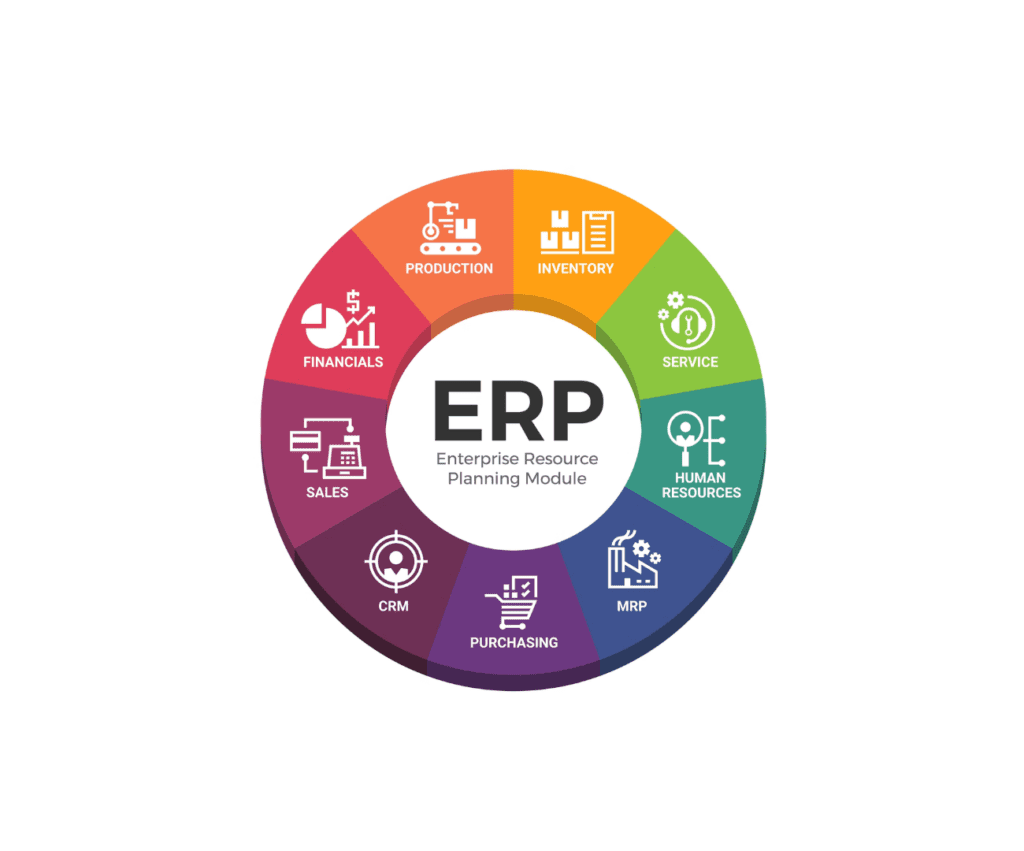In today’s fast-paced business world, companies are constantly seeking ways to streamline their operations and improve their efficiency.
One technology that has revolutionized the way businesses operate is the cloud.
Cloud technology allows companies to access their data and software applications from anywhere, at any time, and from any device.
This flexibility and accessibility have made ERP cloud solutions a popular choice for businesses of all sizes.
ERP Cloud Solutions are software applications that integrate various business processes and functions, such as finance, human resources, inventory management, and sales, into a single system.
The integration of these processes in a cloud-based environment offers numerous benefits, including increased efficiency, cost savings, scalability, and improved data security.
In this article, we will explore how ERP Cloud Solutions are streamlining business operations with cloud technology.
What Is ERP?

ERP stands for Enterprise Resource Planning.
It is a type of software system that allows businesses to manage and automate a wide range of processes and functions across various departments and locations.
The primary objective of an ERP system is to provide a single, centralized view of all business operations, data, and resources in real time, making it easier for businesses to make informed decisions and optimize their operations.
ERP software typically integrates various business processes, such as finance, human resources, procurement, inventory management, sales, and marketing, into a single, unified system.
This integration allows businesses to standardize their processes, eliminate redundant tasks, reduce errors, and enhance efficiency.
An ERP system typically consists of various modules or components that can be customized based on the specific needs of a business.
Some of the common modules in an ERP system include:
Financial Management
This module includes functions such as general ledger, accounts payable and receivable, cash management, and financial reporting.
Human Resources Management
This module includes functions such as employee management, payroll, benefits administration, and time and attendance tracking.
Supply Chain Management
This module includes functions such as inventory management, procurement, order management, and logistics.
Customer Relationship Management
This module, which includes functions such as sales automation, customer service, and marketing automation, plays a crucial role in CRM implementation.
Overall, an ERP system can help businesses streamline their operations, reduce costs, increase productivity, and improve customer satisfaction by providing a comprehensive view of their business data and resources.
What Is Cloud ERP?

Cloud ERP (Enterprise Resource Planning) refers to an ERP software system that is hosted on cloud servers and accessed over the internet, rather than installed locally on a company’s own servers or computers.
With cloud ERP, businesses can access their ERP system from anywhere, using any device with an internet connection, providing flexibility and scalability to meet the changing needs of their operations.
Cloud ERP systems are typically delivered as a software-as-a-service (SaaS) model, which means that businesses pay a subscription fee to access the software and its functionalities.
This eliminates the need for businesses to invest in expensive hardware and software infrastructure, as well as the cost of maintenance and upgrades.
Now that we know what is cloud ERP, let’s have a look at some of its benefits.
Benefits Of A Cloud ERP System
Cloud ERP systems offer a range of benefits to businesses, including increased efficiency, cost savings, scalability, improved data security, and flexibility.
Let’s explore these benefits in more detail:
Increased Efficiency
Cloud based ERP solutions can automate and streamline business processes, reducing manual data entry and eliminating data silos.
By providing real-time visibility into all aspects of a business, cloud-based ERP can help businesses make informed decisions more quickly and efficiently.
With a centralized database accessible from anywhere, employees can access the information they need when they need it, without having to rely on manual processes or outdated data.
Cost Savings
Cloud based ERP solutions eliminate the need for businesses to invest in expensive hardware and software infrastructure, as well as the cost of maintenance and upgrades.
With a subscription-based model, businesses can pay only for the features and functionality they need, and scale up or down as required, without incurring additional costs.
Scalability
Cloud ERP systems can easily scale up or down to accommodate changes in business needs, such as increased demand or changes in market conditions.
Businesses can add or remove users, modules, and applications as required, without the need for additional hardware or software infrastructure.
Improved Data Security
Cloud-based ERP providers typically offer robust data security measures to protect sensitive business data from unauthorized access or breaches.
This includes measures such as encryption, firewalls, and regular data backups, which can help businesses mitigate the risks associated with data breaches.
Flexibility
Cloud-based ERP solutions are accessible from anywhere with an internet connection, providing businesses with greater flexibility and the ability to work remotely.
This can help businesses adapt to changing work environments, such as remote work, and make it easier for employees to access critical data and applications from any device.
Overall, cloud-based ERP solutions offer businesses a more flexible, cost-effective, and scalable alternative to traditional on-premise ERP systems, allowing them to better manage their operations and stay competitive in today’s fast-paced business environment.
How To Implement A Cloud-Based ERP Solution

Implementing an ERP cloud solution can be a complex process, but here are some general steps you can follow to help ensure a successful implementation:
Determine Your Business Requirements
The first step in implementing an ERP solution is to understand your business requirements.
This includes analyzing your business processes, identifying pain points, and determining what features and functionalities your ERP solution should have.
Select The Right ERP Solution
Once you have a clear understanding of your business requirements, you can begin researching and evaluating ERP solutions that meet your needs.
Some key factors to consider when selecting an ERP solution include scalability, ease of use, customization options, and cost.
Choose A Cloud Provider
After selecting an ERP solution, you need to choose a cloud provider that can host your solution.
Some popular cloud providers include Amazon Web Services (AWS), Microsoft Azure, and Google Cloud Platform.
Plan For Data Migration
If you are transitioning from an existing ERP solution, you will need to plan for data migration.
This involves moving your existing data to the new cloud-based ERP solution. It’s important to ensure that your data is clean, complete, and accurate before migrating it.
Configure The ERP Solution
Once you have your ERP solution up and running on the cloud, you will need to configure it to meet your specific business requirements.
This involves setting up workflows, user roles, and permissions, and customizing reports and dashboards.
Test The ERP Solution
Before going live with your cloud-based ERP solution, it’s important to thoroughly test it to ensure it meets your business requirements and works as expected.
Train Your Staff
Once the ERP solution has been configured and tested, you will need to train your staff on how to use it.
This includes providing training on how to navigate the system, input data, and generate reports.
Go Live
After completing all of the above steps, you are ready to go live with your cloud-based ERP solution.
It’s important to closely monitor the system during the first few weeks to ensure everything is working as expected and make any necessary adjustments.
Transition To The Cloud With Blue Zorro
If you’re looking for a seamless transition to the cloud that meets all of your company’s unique requirements, look no further than Blue Zorro!
Our software dedicated team offers efficient and effective solutions to ensure your move to the cloud is as smooth as possible.
Say goodbye to headaches and hello to a stress-free cloud transition with Blue Zorro.
At our company, we’re all about bringing your ideas to life through custom software development and implementation solutions.
We take a lean and user-centric approach to product innovation, ensuring that our software is tailored to meet your unique business needs.
And we don’t skimp on talent, either.
Our team is made up of the best and brightest from both industry and academia, so you can rest assured that you’re getting top-notch service no matter where you are in the world.
Let us help you turn your vision into a reality!
Final Thoughts
In today’s fast-paced business environment, staying competitive means being able to adapt to change quickly and efficiently.
This is where ERP cloud solutions come in.
By leveraging the power of cloud technology, businesses can streamline their operations and increase efficiency, all while reducing costs and improving scalability.
From data migration to staff training, the process of implementing a cloud-based ERP solution can be complex, but the benefits are well worth the effort.
With the right ERP solution and cloud provider, businesses can gain real-time visibility into their operations and make data-driven decisions to stay ahead of the competition.
In short, ERP cloud solutions are a game-changer for businesses looking to stay agile and competitive in today’s ever-evolving business landscape.
FAQs
What is ERP in business operations?
ERP, or Enterprise Resource Planning, is a software system that enables businesses to manage and integrate their core business processes, including finance, accounting, human resources, supply chain, and inventory management.
ERP systems provide a centralized database that helps organizations automate and streamline their operations, enabling them to make informed decisions and respond quickly to changes in the market.
By integrating all key business functions into a single system, ERP helps organizations improve efficiency, reduce costs, and enhance productivity.
What type of cloud service type would an ERP solution typically be in?
An ERP solution is typically hosted on a public or private cloud, depending on the specific needs of the organization.
Public cloud services, such as Amazon Web Services (AWS), Microsoft Azure, and Google Cloud Platform, offer a cost-effective solution that is easy to scale and can be accessed from anywhere with an internet connection.
Private cloud services, on the other hand, are typically hosted on dedicated servers and offer greater security and control over the environment.
Regardless of the type of cloud service used, an ERP solution in the cloud can provide businesses with significant advantages, including improved scalability, flexibility, and accessibility.


